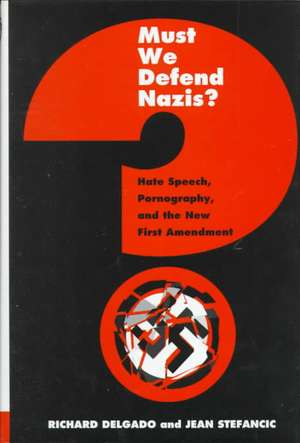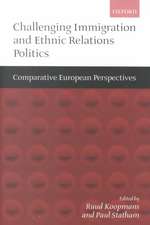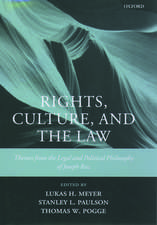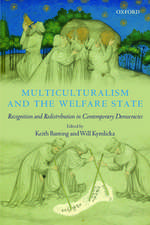Must We Defend Nazis?: Hate Speech, Pornography and the New First Amendment
Autor Richard Delgado, Kristina Gibson Jean Stefancicen Limba Engleză Hardback – 31 dec 1996
Over the past hundred years, almost all of American law has matured from the mechanical jurisprudence approach--which held that cases could be solved on the basis of legal rules and logic alone--to that of legal realism--which maintains that legal reasoning must also take into account social policy, common sense, and experience. But in the area of free speech, the authors argue, such archaic formulas as the prohibition against content regulation, the maxim that the cure for bad speech is more speech, and the speech/act distinction continue to reign, creating a system which fails to take account of the harms speech can cause to disempowered, marginalized people. Focusing on the issues of hate-speech and pornography, this volume examines the efforts of reformers to oblige society and law to take account of such harms. It contends that the values of free expression and equal dignity stand in reciprocal relation. Speech in any sort of meaningful sense requires equal dignity, equal access, and equal respect on the parts of all of the speakers in a dialogue; free speech, in other words, presupposes equality. The authors argue for a system of free speech which takes into account nuance, context-sensitivity, and competing values such as human dignity and equal protection of the law.
Preț: 524.54 lei
Preț vechi: 681.22 lei
-23% Nou
Puncte Express: 787
Preț estimativ în valută:
100.38€ • 104.41$ • 82.87£
100.38€ • 104.41$ • 82.87£
Carte tipărită la comandă
Livrare economică 14-28 aprilie
Preluare comenzi: 021 569.72.76
Specificații
ISBN-13: 9780814718582
ISBN-10: 0814718582
Pagini: 238
Dimensiuni: 160 x 234 x 22 mm
Greutate: 0.45 kg
Ediția:New.
Editura: NEW YORK UNIVERSITY PRESS
ISBN-10: 0814718582
Pagini: 238
Dimensiuni: 160 x 234 x 22 mm
Greutate: 0.45 kg
Ediția:New.
Editura: NEW YORK UNIVERSITY PRESS
Textul de pe ultima copertă
Speech in any sort of meaningful sense requires equal dignity, equal access, and equal respect on the parts of all of the speakers in a dialogue; free speech, in other words, presupposes equality. The authors argue for a system of free speech that takes into account nuance, context-sensitivity, and competing values such as human dignity and equal protection of the law.

















